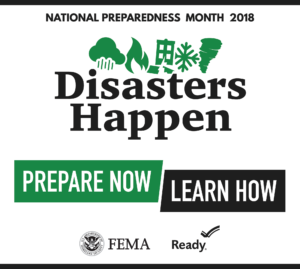September is National Preparedness Month
National Preparedness Month, recognized each September, provides an opportunity to remind us that we all must prepare ourselves and our families now and throughout the year. Throughout the month we will focus on planning, with an overarching theme: Disasters Happen. Prepare Now. Learn How.
Reduce the Impacts of Emergencies and Disasters
Last week we talked about methods to prevent bad things from happening to us. Unfortunately, we cannot prevent everything but we can take steps to reduce their effects on our lives. Mitigation activities are efforts undertaken to reduce the impacts of emergencies and disasters. Reducing the impacts from a crisis increases our ability to be resilient and better recover from the crisis.
Week 3: Mitigation
We can’t prevent every crisis but we can take steps in advance to reduce their impacts and mitigate their effects.
Detect fires and hazards early
- Install and maintain smoke detectors.
- Install and maintain carbon monoxide detectors.
Protect your digital life
We live in a digital age with much information stored on our electronic devices. What would you do if your computer, tablet, or phone was lost or damaged? What would happen to your research, classwork, and personal records and photographs?
Back up your data and information using one or more of these methods.
- Commercial backup software or services.
- Store your data online in the cloud using Google Drive, Box, Microsoft OneDrive, Dropbox, or another service.
- Copy your data to one or more flash drives or portable hard drives and store them in a safe, secure location away from your computer.
- Cornell IT offers a variety of data storage and backup services.
Print out phone lists so you can still contact friends and family if you lose your phone.
Protect your belongings
- Protect electronics and equipment from electrical damage by installing electrical surge protectors and uninterruptible power supplies (UPS).
- Keep your belongings off the floor so they are not damaged by water leaks and floods.
Reduce the financial impacts of emergencies and disasters.
- Annually review and update your insurance coverage.
- Make sure you have the right insurance coverage.
- If you are a student, are you covered by your parent’s insurance?
- Renters should consider renters insurance to protect your belongings.
- Students, including those living in campus housing, should consider the need for student property insurance.
- Homeowners and renters should consider the need for flood insurance.
- Plan financially for the possibility of disaster.
Protect campus operations from disruption.
The Cornell community relies on functions and services provided by many campus units. The need to stop or suspend those services due to an emergency can have negative impacts on campus academic, research, and other activities. Campus units are encouraged to develop Continuity of Operations Plans (COOP) to better continue their most important functions during a crisis. Continuity of Operations Plans are useful in small scale incidents that just impact a single building or unit, and larger campus-wide incidents.
Individuals can engage in this type of contingency planning as well.
- Consider what you would do if some of the resources (people, facilities, services, funds, or equipment) that you normally rely on were unavailable.
- What are the most import things you need to keep doing?
- What are the things that you could temporarily stop doing?
- How would you continue doing those important things without those resources?
As you can see, contingency planning is just another way of making ourselves more resilient. By evaluating the resources we use and considering alternative options we are better prepared to continue our lives in the face of adversity.
Preparedness Month Topics by Week
- Week 1: Make and Practice Your Plan
- Week 2: Learn Life Saving Skills and Prevention
- Week 3: Reduce the Impacts of Emergencies and Disasters Through Mitigation
- Week 4: Be Ready to Act and Respond in an Emergency

